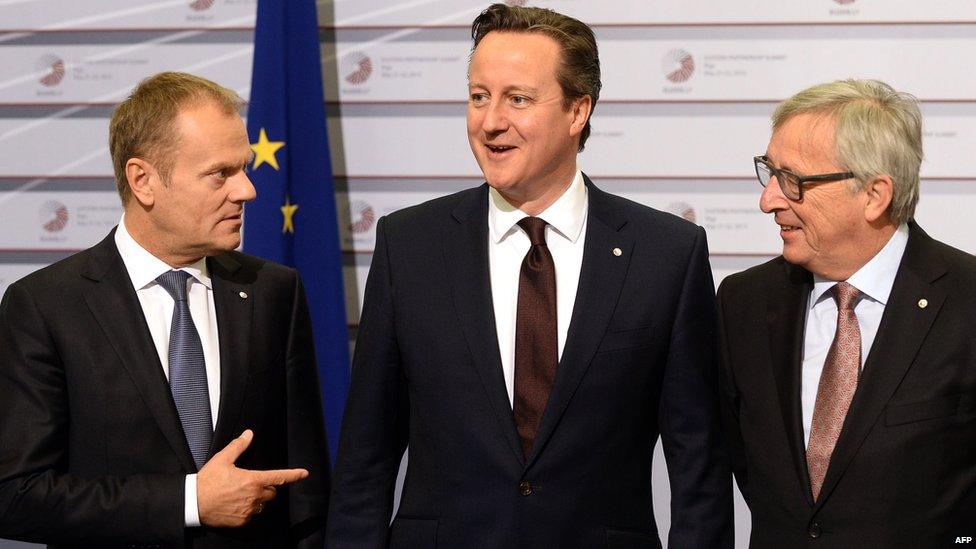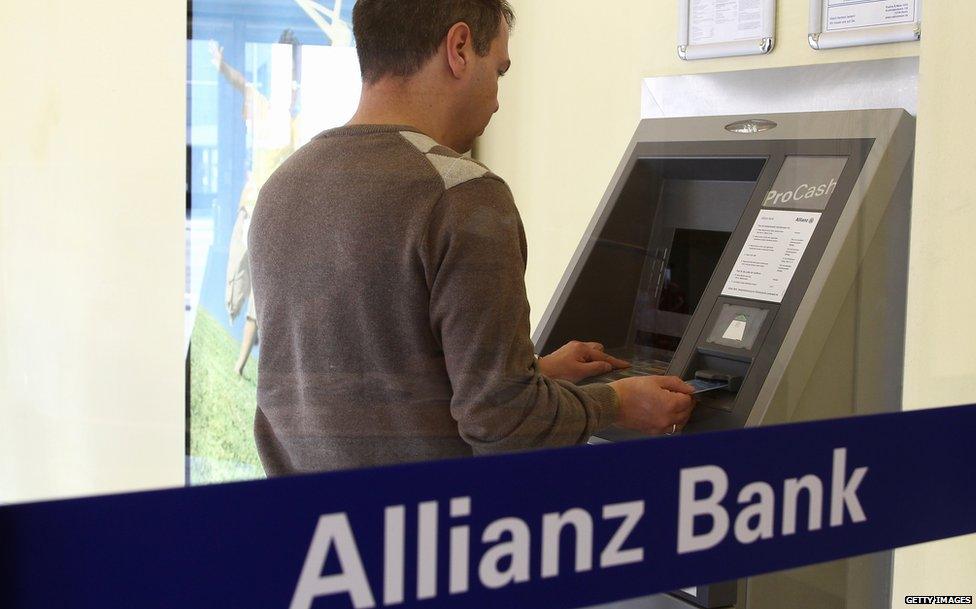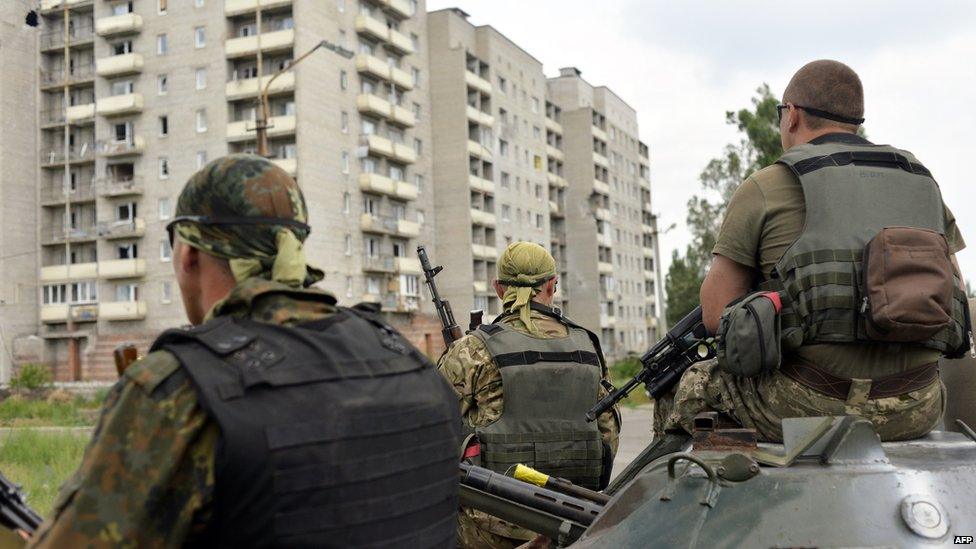EU summit: Greece and migrants to dominate agenda
- Published

The UK's David Cameron (centre) with EU leaders - diplomatic smiles despite some serious divisions
Another "crunch" EU summit looms - it sounds like a cliche, but the EU leaders' in-tray really is piled high this time.
These are tough times for the 19-nation eurozone, as its recovery from the debt crisis remains anaemic, with persistently high unemployment and weak growth.
What are the key issues that will dominate the leaders' talks in Brussels on Thursday and Friday?

Avoiding Greek default and Grexit
Greece in numbers
€320bn
Greece's debt mountain
€240bn
European bailout
-
177% country's debt-to-GDP ratio
-
25% fall in GDP since 2010
-
26% Greek unemployment rate
Greece is just days away from possible default and empty coffers.
Eurozone finance ministers meet again on Wednesday, to decide whether the Greek government's new reform package meets the bailout conditions. That could determine whether the leaders arrive smiling or grim-faced.
Agreement would provide only a temporary breathing space. Greece would not crash out of the euro, a bank run could be avoided, but Greece's debt mountain is 177% of GDP - nearly double the country's total annual economic output.
A deal would unblock the €7.2bn (£5bn; $8bn) of bailout money that Greece desperately needs. But Greece will need tens of billions of euros more in future, to make its economy viable and pay off its colossal debts.
The Greek crisis affects market confidence in the euro. But it is also a clash of visions about Europe.
Richer countries such as Germany and the Netherlands demand budgetary rigour and refuse to end up subsidising indebted southern Europeans.
The leftist Greek government and many ordinary Greeks reject austerity and the liberal free market agenda. The anti-austerity mood is also strong in Spain and other EU countries hit hard by the debt crisis.

Deepening monetary union

German economic health contrasts with weakness in other eurozone countries
EU leaders believe that eurozone stability depends on further integration, co-ordinating economic targets. The debt crisis dramatically exposed how weaknesses in one country could undermine its eurozone partners.
But getting there is politically fraught - populists across Europe have made gains in elections by rejecting the "ever closer union" idea.
A blueprint for deeper eurozone integration, external has been written by European Commission President Jean-Claude Juncker and other top EU officials, including European Central Bank President Mario Draghi. It will be a focus of the talks, and among its proposals are:
Setting up national competitiveness authorities, to improve productivity in Europe
Developing a full banking union, including a common deposit guarantee scheme
A future "euro area treasury" and more sharing of public risk, which could mean eurobonds
Treaty change is considered necessary to give a solid legal basis to economic integration.
The document suggests, however, that treaty change would be postponed until after general elections in France and Germany in 2017.
The UK and other EU states outside the euro - including Denmark and Poland - want the eurozone to prosper, but not if it means a two-tier system with eurozone countries setting the agenda and rules for the single market.

UK renegotiation
Katya Adler explains how Poland is likely to react to David Cameron's plans for EU reform
UK Prime Minister David Cameron will not want Greece to dominate the summit talks, because he wants to get support among the leaders for EU reforms meaningful enough to persuade a sceptical British public.
This summit is his launch pad for renegotiation of the UK's EU membership terms, ahead of the UK in/out referendum promised by the end of 2017.
Mr Cameron has had meetings with national leaders individually, on a European tour. He will need to get all 27 other member states to sign up to new arrangements for the UK.
The EU principle of free movement of people is non-negotiable - EU leaders have made that clear to Mr Cameron.
But there is scope for change in the rules on migrants' benefits - a key issue for the UK Conservatives.
Mr Cameron is also expected to push for an opt-out from the EU's "ever closer union" ambition, and for guarantees that the rights of "euro outs" will not be watered down - especially in the single market - as eurozone integration advances.

Migrant influx
How can EU address its migrant issue?
EU solidarity is under severe strain because of the surge in migrants fleeing Libya aboard unseaworthy boats bound for Italy.
Tensions rose when France blocked hundreds of African migrants at the Italian border. But any re-imposition of border controls would violate the spirit of the EU's Schengen agreement.
Greece is also struggling with record numbers of migrants - and the boats will probably keep coming in the summer months.
A Mediterranean naval operation has been launched to track people-smuggling networks. The EU wants to get a UN mandate to use force to stop the people-smugglers.
The European Commission has drawn up plans to ease the burden, external faced by Italy and Greece, but the idea of mandatory quotas for moving migrants to other EU countries is not popular.
The plan is to relocate 60,000 asylum seekers from Syria and Eritrea, who fled war and/or persecution. Economic migrants would not qualify.
France and Germany say the Commission's "distribution key" for relocating them needs further work. And several East European countries reject mandatory quotas, saying migrants do not want to be told where to live.

Tensions with Russia

Ukrainian troops near Donetsk - sporadic skirmishes continue
The EU decided this week to extend the sanctions against Russia until the end of January 2016. So that is unlikely to take up much time at the summit.
Russia is still helping the pro-Russian separatists in eastern Ukraine with heavy weapons and troops, Western leaders say. Moscow denies that.
But the sanctions are hurting the EU too, with Russia blocking imports of Western food. Italy and Greece are among the countries eager to get sanctions eased or lifted. But there has to be progress towards a peace settlement in Ukraine for that to happen.
Continuing clashes in eastern Ukraine mean that the rebels and Ukrainian government forces are still far from the targets agreed in the Minsk ceasefire deal.